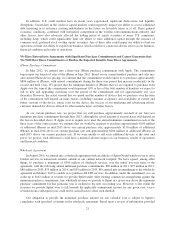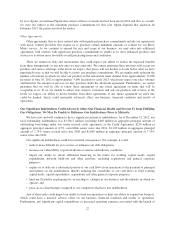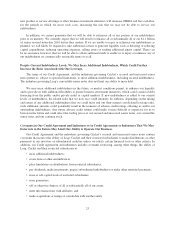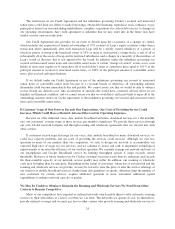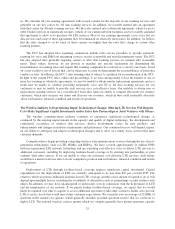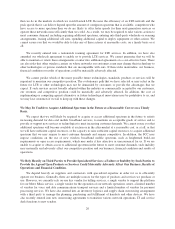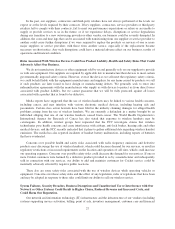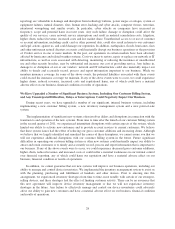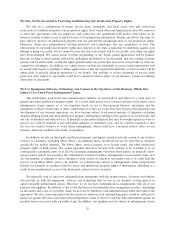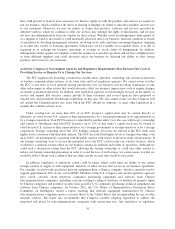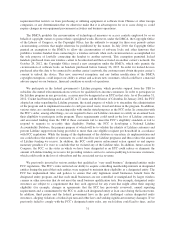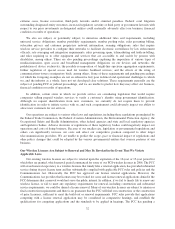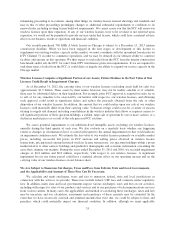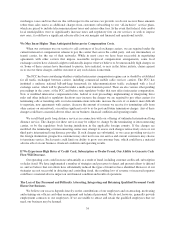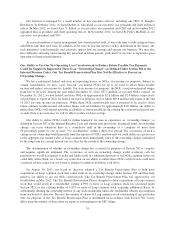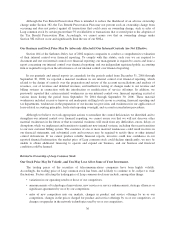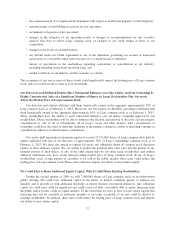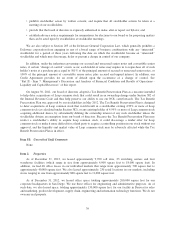Cricket Wireless 2012 Annual Report Download - page 45
Download and view the complete annual report
Please find page 45 of the 2012 Cricket Wireless annual report below. You can navigate through the pages in the report by either clicking on the pages listed below, or by using the keyword search tool below to find specific information within the annual report.requirement that restricts us from purchasing or utilizing equipment or software from Chinese or other foreign
companies, or any determination that we otherwise make that it is advantageous for us to cease doing so, could
require changes in our equipment procurement activities and business operations.
The DMCA prohibits the circumvention of technological measures or access controls employed by or on
behalf of copyright owners to protect their copyrighted works. However, under the DMCA, the Copyright Office
of the Library of Congress, or the Copyright Office, has the authority to exempt for three-year periods certain
circumventing activities that might otherwise be prohibited by the statute. In July 2010, the Copyright Office
granted an exemption to the DMCA to allow the circumvention of software locks and other firmware that
prohibit a wireless handset from connecting to a wireless network when such circumvention is accomplished for
the sole purpose of lawfully connecting the handset to another network. This exemption permitted locked
handsets purchased from one wireless carrier to be unlocked and then activated on another carrier’s network. On
October 28, 2012, the Copyright Office issued a new exemption under the DMCA, which only permits the
circumvention of software locks on handsets purchased before January 26, 2013. In order for locked devices
purchased after this date to be connected to another carrier’s network, the customer must obtain the prior carrier’s
consent to unlock the device. This new, narrowed exemption, and any further modification of the DMCA
copyright exemption, could impact our ability to attract and activate new customers, which could have a material
adverse impact on our business, financial condition or results of operations.
We participate in the federal government’s Lifeline program, which provides support from the USF to
subsidize discounted telecommunications services for qualified low-income consumers. In order to participate in
the Lifeline program in any given state, a carrier must be designated as an ETC in that state. As of December 31,
2012, Cricket had been designated as an ETC in 27 states and the District of Columbia. In January 2012, the FCC
adopted an order regarding the Lifeline program, the stated purpose of which is to streamline the administration
of the program and to implement measures to curb perceived waste, fraud and abuse in the program. In addition,
various states are considering or enacting rules with similar stated purposes as the FCC order. In connection with
the FCC’s order, among other things, we are required to have our Lifeline customers re-certify on an annual basis
their eligibility to participate in the program. These requirements could result in the loss of Lifeline customers
and associated funding from the USF if these customers fail to meet the FCC’s eligibility standards or fail to
respond to requests to re-certify their eligibility. Further, the FCC is developing a National Lifeline
Accountability Database, the primary purpose of which will be to validate the identity of Lifeline customers and
prevent Lifeline support from being provided to more than one eligible recipient per household in accordance
with FCC regulations. While the timing of the deployment of the database is uncertain, its implementation and
use could reduce the number of customers we could enroll in our Lifeline programs and thus reduce the amount
of Lifeline funding we receive. In addition, the FCC could pursue enforcement action against us and impose
monetary penalties if it were to conclude that we violated any of the Lifeline rules. In addition, future action by
Congress, the FCC, or the states in which we have been designated as an ETC could reduce or eliminate the
amount of Lifeline funding we receive for providing wireless service to certain qualifying low income customers,
which could result in the loss of subscribers and the associated service revenue.
We previously invested in various entities that qualified as “very small business” designated entities under
FCC regulations. The FCC’s rules restricted our ability to acquire controlling membership interests in designated
entities during the period that such entities were required to maintain their eligibility as a designated entity. The
FCC has implemented rules and policies to ensure that only legitimate small businesses benefit from the
designated entity program, and that such small businesses are not controlled or manipulated by larger wireless
carriers or other investors that do not meet the small business qualification tests. For example, designated entity
structures are subject to a requirement that they seek approval for any event that might affect their ongoing
eligibility (for example, changes in agreements that the FCC has previously reviewed), annual reporting
requirements and a commitment by the FCC to audit each designated entity at least once during the license term.
In addition, third parties and the federal government have in the past challenged certain designated entity
structures, alleging violations of federal qui tam and other laws and seeking significant monetary damages. If we
previously failed to comply with the FCC’s designated entity rules, any such failure could lead to fines, and in
31


